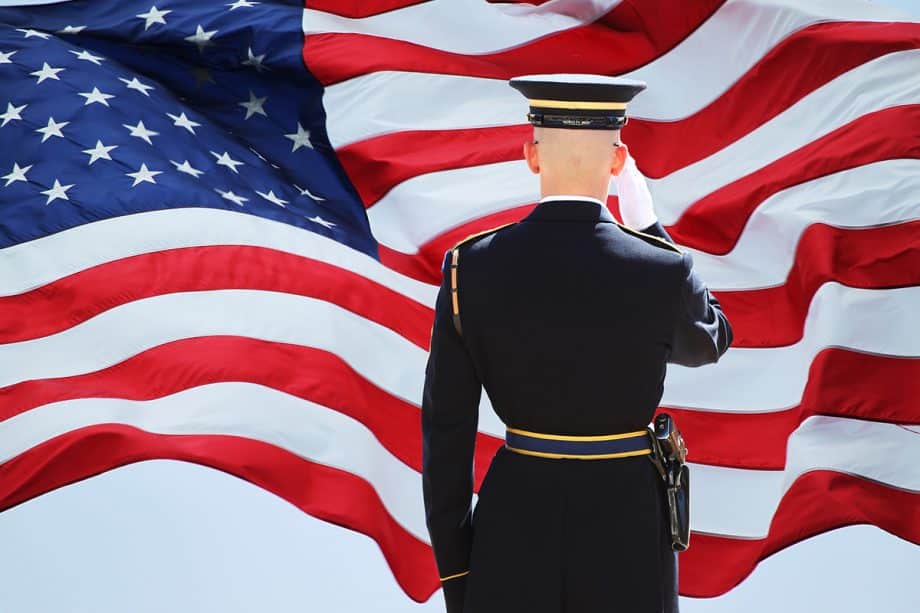The Departments of Defense and Veterans Affairs report that an active-duty service member or veteran dies by suicide nearly once an hour.
After their service, many veterans face unique challenges, including post-traumatic stress disorder (PTSD), depression, anxiety, and other mental health issues. By raising awareness about veteran suicide, we can promote the importance of mental health support and ensure that veterans have access to the resources they need.
To help raise awareness, there’s one retired United States Marine who spends Memorial Day weekend honoring veterans on the street in Washington, DC for 24 hours saluting. This is Staff Sergeant Tim Chambers, better known as The Saluting Marine.
Who is Tim Chambers?
Tim Chambers, also known as "The Saluting Marine," is a former United States Marine Corps Staff Sergeant who gained recognition for his patriotic display during the annual Rolling Thunder motorcycle rally in Washington, D.C. He served in the Marine Corps for eight years and was honorably discharged in 2003.
Chambers became widely known for his unique tribute during the Rolling Thunder event, which was a demonstration ride to raise awareness for prisoners of war (POWs) and those missing in action (MIA). Standing at attention for hours at a time, dressed in full Marine Corps dress uniform, Chambers would salute and hold his salute as thousands of motorcycles passed by him. His salute became a symbol of respect and honor for veterans and the sacrifices they made for their country.
Chambers' acts of patriotism and dedication gained significant media attention and made him an iconic figure among veterans and supporters of the military community. His commitment to honoring the nation's servicemen and women has been widely appreciated and recognized.
What is Rolling Thunder?
The annual motorcycle rally takes place in Washington, D.C. It was organized to raise awareness about prisoners of war (POWs), those missing in action (MIA), and to advocate for veteran's rights and benefits. The event originally started in 1988 and continued until 2019.
The Rolling Thunder motorcycle rally occurs on Memorial Day weekend and draws thousands of participants, including veterans, motorcycle enthusiasts, and supporters across the United States. The main highlight of the event is a massive motorcycle procession that traveled through the streets of Washington, D.C., passing iconic landmarks such as the Pentagon and the National Mall. Another important highlight is The Saluting Marine.
Participants gather at the Pentagon parking lot, preparing for the ride. Motorcyclists adorn their bikes with flags, banners, and patriotic symbols, creating a visually striking display of support for veterans and their causes. The procession then proceeds into the heart of Washington, D.C., creating a thunderous roar of motorcycles as they rode through the city.
The purpose of Rolling Thunder is to bring attention to the issue of POWs and MIAs and to advocate for their return and proper recognition. The event also aims to raise awareness about the sacrifices made by veterans and to support their rights and benefits, including healthcare, education, and job opportunities.
Throughout the years, Rolling Thunder has become an iconic event, drawing significant media coverage and attracting spectators who lined the streets to show their support. It serves as a platform for veterans and their supporters to unite, raise their voices, and bring attention to important issues affecting the veteran community.
Other Ways to Support Veterans
In addition to Rolling Thunder, there are several other ways to support veterans and bring attention to the important issues they face:
Volunteer: Get involved with local organizations that support veterans. Volunteer your time and skills to assist with programs that provide services like job training, housing assistance, mental health support, or social activities for veterans. By actively engaging with these organizations, you can directly contribute to improving the lives of veterans in your community.
Raise awareness: Use your voice and platforms to raise awareness about veteran issues. Share information, stories, and statistics about the challenges veterans face, such as mental health issues, unemployment, homelessness, and difficulties in transitioning to civilian life. Use social media, blogs, or public speaking opportunities to educate others and encourage discussions about these important topics.
Advocate for policy changes: Contact your local representatives and advocate for policies that support veterans' rights and benefits. Stay informed about proposed legislation that affects veterans and take action by writing letters, making phone calls, or attending town hall meetings to express your support for policies that address veterans' needs. Join or support veteran advocacy organizations that work on legislative issues.
Support veteran-owned businesses: Seek out and support businesses owned by veterans. This can include restaurants, retail stores, service providers, or contractors. By patronizing these businesses, you not only contribute to their success but also help create economic opportunities for veterans and their families.
Fundraise and donate: Organize or participate in fundraising events to support organizations that assist veterans. These funds can be used to provide essential services, such as healthcare, housing, education, and job training. Additionally, consider donating directly to veteran support organizations or programs addressing issues like mental health, suicide prevention, or homelessness.
Offer employment opportunities: If you're able to do so, consider hiring veterans or advocating for veteran hiring programs within your organization. Veterans bring unique skills and experiences to the workforce, and providing employment opportunities can greatly assist them in their transition to civilian life.
Listen and support: Be a compassionate listener for veterans who may want to share their experiences or struggles. Offer support and understanding and connect them with resources or organizations that can assist. Sometimes, a simple act of empathy and being there for someone can make a significant difference.
Remember that supporting veterans and raising awareness is an ongoing commitment. By actively participating in these efforts, you can help create a more supportive and inclusive society for those who have served their country.

